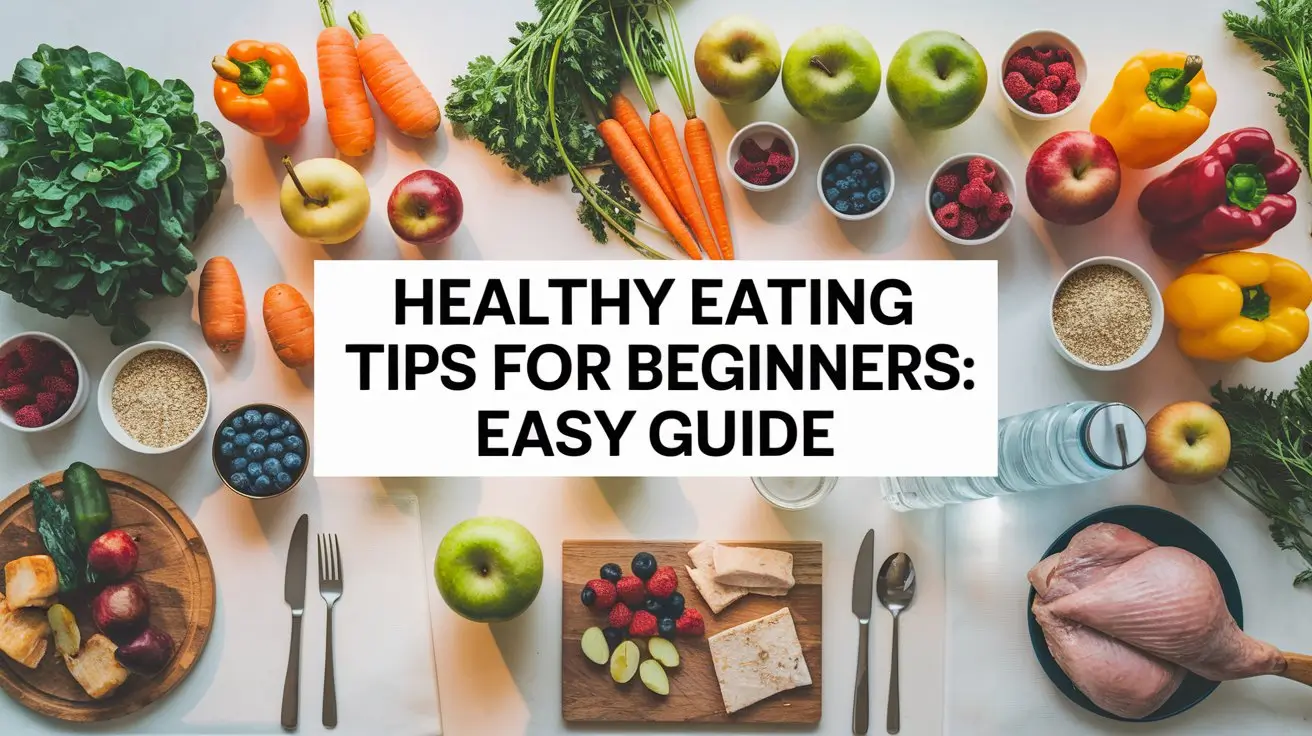Healthy Eating Tips for Beginners can make it easier to adopt a healthier lifestyle. Eating healthy always sounded simple to me—choose better foods, right? But when I tried to change my eating habits, I came to the realization that it wasn’t easy.
There were so many diets, conflicting advice, and foods I wasn’t sure how to cook. I didn’t want to give up my favorite meals, but I also wanted to feel better and have more energy.
If you’re starting your healthy eating journey, I get it. It’s not about being perfect; it’s about making small, realistic changes that add up over time. Every step matters. Swap processed snacks, add veggies to meals, or drink more water.
A Beginner’s Guide to Eating for Better Health
Starting your journey to healthy eating is exciting. It’s key to know the basics of a balanced diet. Healthy eating is more than just following tips. It’s about making choices that are good for your body.
Eating a balanced diet gives your body the nutrients it needs. It provides nutrients, vitamins, and minerals for proper function.
Newcomers should focus on whole foods. This includes fruits, veggies, whole grains, lean proteins, and healthy fats. These foods are the building blocks of a healthy lifestyle. Adding them to your meals helps you build lasting, healthy habits.
-
Eat a variety of colors to ensure you’re getting a range of vitamins and minerals.
-
Incorporate healthy fats like nuts, seeds, and avocados into your meals.
-
Go for whole grains instead of processed ones.
By following these tips and eating whole foods, you’ll develop healthy habits. These habits will benefit you for many years.
Essential Healthy Eating Tips for Beginners
Starting your journey to healthier eating is exciting. It’s key to have the right knowledge to guide you. Essential tips include planning meals, making a grocery list, and learning basic cooking. These tips will help you build a balanced diet that is good for your body.
When planning meals, think about your lifestyle and what you like. Do you need quick meals because of a busy schedule, or do you enjoy cooking? Understanding your needs helps you make a meal plan that fits your life. Start by planning meals for the week, including breakfast, lunch, dinner, and snacks.
Here are some beginner-friendly healthy eating tips to get you started:
-
Shop the outer aisles. You’ll find fresh foods like produce, meat, and dairy there.
-
Choose whole grains over processed foods.
-
Cook at home using simple recipes and ingredients.
Use these tips to choose better foods and build healthy habits for life. Remember, healthy eating is a journey. Take things one step at a time—there’s no rush. With practice and patience, you’ll gain confidence in making healthy choices. This will help you create a balanced diet that suits you.
Smart Grocery Shopping Strategies

Starting a healthy eating journey can feel overwhelming, and grocery shopping is a big part of it. To make it easier, it’s key to have smart strategies. First, plan what you need before you go to the store. Think about your diet goals and meals for the week. Please make a list of ingredients and try to stick to it to avoid buying things you don’t need.
When you’re at the supermarket, focus on the perimeter of the store. That’s where you’ll find fresh produce, meats, and dairy. These foods are often less processed and more nutritious. When you go to the center aisles, be careful with food labels. Choose items with fewer ingredients and less added sugar, salt, and unhealthy fats.
-
Shop the sales: Plan your meals around what’s on sale to save money and reduce food waste.
-
Buy in bulk: When you buy grains, nuts, and dried fruits in bulk, you save money and create less packaging waste.
-
Check labels closely. Choose products low in added sugars, salt, and unhealthy fats. Look for those that are high in essential nutrients.
By using these smart strategies, you’ll be on your way to a healthier eating journey. You’ll start with habits that will last a lifetime.
Building a Sustainable Meal Plan
Starting a healthier lifestyle means making a personalized meal plan. Tips for beginners highlight the need to plan for good nutrition. A good meal plan keeps you on track, saves time, and cuts down on waste.
Beginners should aim for small, doable goals. First, figure out what you need based on your lifestyle, food preferences, and health goals. Then, make a meal plan that fits your needs.
When making a meal plan, keep these points in mind:
-
Set realistic goals and track your progress.
-
Focus on whole, nutrient-rich foods.
-
Learn to cook simple, healthy meals.
-
Drink plenty of water to stay hydrated.
Remember, a sustainable meal plan is all about finding a balance that works for you. By following these tips, you’ll build lasting, healthy habits.
With a bit of planning and creativity, you can make a meal plan that’s good for you and tasty. Start making your sustainable meal plan today. It’s the first step to a healthier, happier you!
Kitchen Setup and Meal Prep Basics
Starting healthy eating habits is easier with a good kitchen setup and meal prep skills. Simple tips help you create a space for nutritious food. This way, you avoid unhealthy takeout or convenience foods.
First, stock your kitchen with key tools like a chef’s knife, cutting board, and pots and pans. These basics make healthy meal prep easier. Learning basic cooking techniques like roasting, grilling, and sautéing is also important. They help you make a variety of healthy dishes.
Essential Kitchen Tools
-
A good chef’s knife.
-
A cutting board.
-
A set of pots and pans.
-
A slow cooker or an Instant Pot.
With your kitchen ready and basic cooking skills learned, it’s time for meal prep. Plan your meals, make a grocery list, and prep healthy snacks and meals ahead. These steps help you stick to healthy eating habits for the long term.
Common Mistakes to Avoid
Starting a healthy eating journey can be tricky. Be mindful of common mistakes that can get in the way. Avoiding restrictive dieting and over-exercising is key. These methods might show quick results but can harm your health in the long run. Instead, aim for balanced eating and regular exercise.
Having a solid meal plan is vital for success. Beginner-friendly healthy eating tips suggest eating a variety of whole foods. A healthy diet includes fruits, veggies, whole grains, lean proteins, and good fats. Stay away from fad diets and build a lasting bond with healthy foods. This way, you’re more likely to stick to your plan and reach your goals.
Watch out for these common slip-ups:
-
Restrictive dieting, which can lead to nutrient deficiencies and disordered eating,
-
Overexercising can cause injury and burnout.
-
Not listening to your body and ignoring hunger and fullness cues.
Knowing what to avoid makes it easier to stay on track. Focus on building a healthy relationship with food and exercise. Remember, success in healthy eating is about progress, not perfection. Here’s some key advice for beginners in healthy eating. Follow these tips, and you’ll be on your way to reaching your health and wellness goals.
Incorporating Healthy Habits into Daily Life
Starting a healthy eating journey means adding good habits to your daily routine. It’s not easy, but simple steps can help you succeed. Start by making your mornings better with a glass of water, a nutritious breakfast, and a short walk.
A good morning routine boosts your energy and sets a positive tone for the day. It’s also key to eat well at work. Pack a healthy lunch, avoid sugary snacks, and drink plenty of water.
Social dining can be tough when you’re trying to eat healthily. But you can handle it with a few tricks. Eat a healthy meal before going out, pick healthy menu options, and watch your part sizes. These habits will help you reach your healthy eating goals and live a balanced life.
Here are more tips for healthy habits in your daily life:
-
Plan your meals ahead.
-
Buy healthy groceries.
-
Drink water all day.
-
Get enough sleep each night.
Follow these tips and make healthy choices. This way, you’ll build lasting habits that support your health and well-being.
Tracking Progress and Staying Motivated
Starting a healthier diet is exciting. But it’s key to track your progress and stay motivated. Beginner’s tips for a healthy diet can really help. By setting goals and watching your progress, you’ll find it easier to follow your plan.
Here are some healthy eating tips for beginners to keep you going:
-
Keep a food journal to see what you’re eating each day.
-
Set realistic goals, such as eating five servings of fruits and vegetables daily.
-
Find healthy alternatives to your favorite foods.
Remember, getting healthier is a journey. Be patient and kind to yourself. With the right mindset and beginner’s tips for a healthy diet, you’ll be on your way to a better life.
Conclusion: Your Journey to Healthier Eating Starts Now
Learning to eat healthily is easier than you think. You now know the basics of balanced nutrition, smart shopping, and meal planning. This knowledge provides you with the tools necessary for healthy eating.
Changing your eating habits takes time and small steps. Try new recipes and get support from loved ones or online groups. With effort and a positive attitude, you’ll live a healthier life.
So, start your journey to better health today. Use the healthy eating tips you’ve learned. Your future self will be grateful for it.
FAQ
What are the key parts of a balanced diet?
A balanced diet includes foods from all major groups. Eating well means including fruits, vegetables, whole grains, lean proteins, and healthy fats. It’s crucial to have the right mix of carbs, protein, and fat for your body.
How can I control part sizes effectively?
Controlling part sizes is key to healthy eating. Use your hand, a small plate, or measuring tools to gauge your portions. Always check serving sizes on labels and adjust as needed.
What are some simple tips for meal planning and grocery shopping?
Begin by planning your meals and making a shopping list. This helps avoid buying unnecessary items and reduces waste. Shop the store’s perimeter for whole foods. Always read labels and choose items that are low in added sugars, sodium, and unhealthy fats.
How can I make healthy cooking and meal prep easier?
Invest in basic kitchen tools like a good knife, cutting board, and containers. Learn simple cooking methods like roasting, sautéing, and steaming. Spend time on weekends preparing ingredients or meals to simplify weeknights.
What are some common mistakes to avoid when starting a healthy eating journey?
Avoid restrictive diets, which can be unsustainable and lead to burnout. Don’t overdo exercise or make too many changes at once. Start small, focus on progress, and be patient with yourself as you build new habits.
How can I stay motivated to maintain healthy eating habits?
Set clear goals that you can measure and track your progress along the way. Celebrate your small victories. Make healthy eating a part of your daily routine, like packing a lunch or trying new recipes. Surround yourself with supportive people to stay on track.
